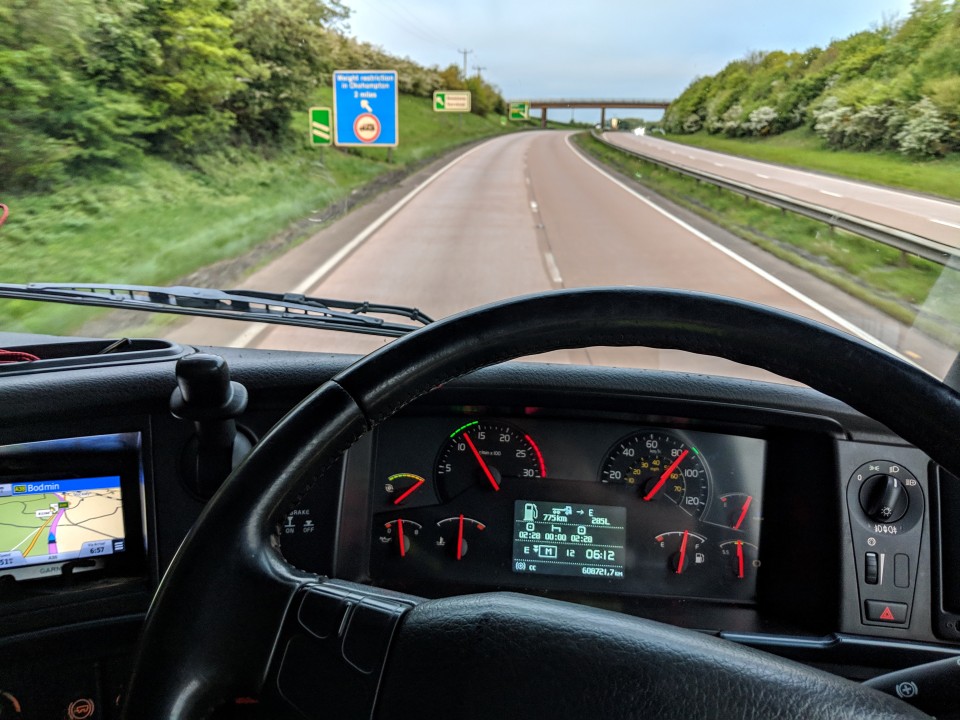
Susie Jones
Nudíte sa na cestách?
Vytvorené: 27. 08. 2024
•
Aktualizované: 27. 08. 2024
Priemerný vodič nákladného vozidla strávi za volantom každý deň približne 12 hodín. Nekonečný čas na otvorenej ceste môže znieť lákavo, avšak realita je v príkrom rozpore. Nespočetné čerpacie stanice, odpočívadlá a dlhé hodiny sa môžu stať únavnými. Vodiči nákladných vozidiel často trávia prestoje mimo domova a zabrániť nude môže byť náročné.
Nedávny prieskum spoločnosti Convoy naznačil, že jedným z hlavných problémov vodičov nákladných vozidiel je nuda. Aký vplyv má nuda na pohodu vodičov? A ako sa môžu vodiči nákladných vozidiel zabaviť?
Ako nuda ovplyvňuje pohodu vodiča
Únava, izolácia, osamelosť a nedostatok duševnej stimulácie sú bežnými problémami vodičov. Niektorí vodiči môžu tieto obavy riešiť nezdravými mechanizmami zvládania - napríklad prejedaním sa, fajčením alebo nadmernou konzumáciou kofeínu. Tieto návyky môžu časom negatívne ovplyvniť duševné zdravie.
Keďže sa však o duševnom zdraví hovorí čoraz lepšie, čoraz viac vodičov sa v boji proti nemu vydáva inou cestou. Na Facebooku sme sa opýtali vodičov nákladných vozidiel, čo robia, keď ich prepadne nuda.
"Audioknihy, hlavne psychológia. Hudba, rozhovory s blízkymi alebo počúvanie rádia. Alebo všetko vypnem a pokojne si žijem so svojimi myšlienkami," hovorí Nigel.
Iní spomínajú, že im pomohol telefonický rozhovor s blízkymi. Ashleigh uvádza:
"Rozprávanie sa s priateľmi v skupinovom chate. Úprimne, keby som ich nemal, už dávno by som s tým skončil. Cesta vyvracia niektoré nezmysly a bez rozhovorov s naozaj dobrými priateľmi by som to nikdy neprežil."
Karl si tiež myslí, že "skupinový chat s priateľmi je nevyhnutný".

Prevencia nudy za volantom
Na rozdiel od všeobecného presvedčenia je jazda nákladným autom fyzicky náročná - vodiči potrebujú koordináciu a koncentráciu, aby sa vyhli nehodám. Napriek tomu môže dlhodobý pobyt za volantom spôsobiť únavu. Môže sa vyskytnúť riziko, že sa vodič pri práci uspokojí, najmä ak dobre pozná svoju trasu. Ako sa môžu vodiči vyrovnať so sebauspokojením za volantom?
Či už ide o počúvanie podcastu alebo chytľavej melódie, vodiči si musia vybrať niečo, čo udrží ich myseľ v pohotovosti. Zostavili sme zoznam vecí, ktoré zabránia nude za volantom.
Podcasty: Vodič nákladného auta Marty počas jazdy počúva "desiatky podcastov". Podcasty sú výborným spôsobom, ako si spestriť prácu a naučiť sa niečo nové. Pozrite si tento užitočný zoznam podcastov pre nákladnú dopravu
Hudba: "Hudba, hudba a ešte raz hudba" je Richardovým prostriedkom na zahnanie nudy. Či už ide o počúvanie rádia alebo spievanie podľa zoznamu skladieb, hudba je vynikajúcim spôsobom, ako udržať myseľ v strehu.
Urobte si prestávku: Hoci vodiči majú prísne termíny a predpisy týkajúce sa tachografov, vystúpenie z kabíny, keď sa začnú nudiť, pomáha mysli znovu sa sústrediť.
Nuda počas prestojov
Vodiči nákladných vozidiel čelia ďalším výzvam, ako sa zabaviť po pracovnej zmene. Aktívny prístup k prevencii nudy počas tohto obdobia je nevyhnutný. Zostavili sme zoznam spôsobov, ako si skrátiť hodiny.
Umiestnenie: Zastávky pre nákladné vozidlá, ktoré ponúkajú širokú škálu zariadení a komunitný charakter, sú vynikajúcim spôsobom, ako zmierniť nudu. Niektoré fungujú ako spoločenské centrum, kde sa vodiči kamiónov môžu podeliť o podobné zážitky. Prejdite na našu stránku lokality a pozrite si, aké zariadenia ponúkajú naši partneri služieb SNAP
Cvičenie: Cvičenie: Každodenná prechádzka alebo kreatívny tréning môžu zabrániť nude a zabezpečiť, že zostanete fit a zdraví. Pozrite si naše tipy, ako si udržať zdravie na cestách ](https://snapacc.com/newsroom/how-to-be-a-healthy-truck-driver/)
Streamingové služby: Sledujte najnovší televízny program alebo prechádzajte sociálne médiá. Vodič kamiónu Steve rád "prechádza a komentuje Facebook a pozerá Netflix", aby si skrátil čas.
Záľuby: Možnosti sú nekonečné. Učenie sa hry na hudobný nástroj, učenie sa cudzieho jazyka, kreslenie, písanie a ďalšie. Zaoberať sa nejakým koníčkom je účinný spôsob, ako zabrániť nude.
Varenie: Varenie jedál v kabíne má mnoho výhod. Nielenže to zabraňuje nude, ale šetrí to peniaze a je to zdravšie.
Zostaňte v kontakte so svojimi blízkymi: Prestávky vodičov nákladných vozidiel sú ideálnou príležitosťou na kontakt s ich najbližšími. Videohovory sú účinným spôsobom, ako sa zblížiť s rodinou a priateľmi.
Uvoľnite sa: Vodiči nákladných vozidiel môžu čeliť stresovým situáciám. Úplné uvoľnenie po zmene môže zlepšiť pohodu vodiča. Relaxačné techniky, ako napríklad hlboké dýchacie cvičenia a meditácia, znižujú stres.
Hoci niektorí vodiči majú radi samotu a nezávislosť, ktorú im otvorená cesta ponúka, pre mnohých je boj s nudou stále výzvou. Vzhľadom na charakter práce sa vodiči nákladných vozidiel často dlho nudia. Na zlepšenie pohody, spokojnosti s prácou a bezpečnosti na cestách však musia nájsť spôsoby, ako ju zmierniť. Či už je to sústredenie sa na plnenie úloh, počúvanie rádia alebo rozhovory s priateľmi a rodinou, väčšina vodičov nákladných vozidiel dokáže nájsť riešenie, ktoré im vyhovuje.

Kde spia vodiči nákladných vozidiel?
Väčšina vodičov spí vo svojich kabínach, pretože sú dobre vybavené na pohodlný spánok. Základná kabína na spanie obsahuje posteľ, úložné priestory, osvetlenie a elektrické zásuvky - je to domov ďaleko od domova.
Vzhľadom na súčasný nedostatok parkovacích miest v Európe mnohí vodiči parkujú na odstavných plochách. Takéto parkovanie sa považuje za nebezpečné a vodič je vystavený nebezpečenstvu krádeže. Od novembra 2017 musia vodiči nákladných vozidiel v Spojenom kráľovstve absolvovať pravidelné týždenné prestávky na odpočinok na riadnych odpočívadlách (ako sú servisné plochy a zastávky pre nákladné vozidlá).
Systém SNAP's Depot Parking umožňuje vozovým parkom ponúknuť svoje parkovacie miesta pre nákladné vozidlá do siete, čím sa zmierňuje nedostatok a pomáha vodičom vyhnúť sa rizikovým situáciám. Okrem toho SNAP poskytuje vodičom na parkovanie viac ako 450 servisných partnerov v celej Európe. Viac informácií nájdete na našej stránke mapy.
Prečo nechávajú vodiči nákladných vozidiel dvere prívesu otvorené?
Ak ste niekedy išli v noci po hlavnej ceste, možno ste si všimli nákladné vozidlá zaparkované s otvorenými dverami prívesu. Mnohí vodiči to robia preto, aby odradili zlodejov, pretože predpokladajú, že ak sú dvere prívesu otvorené, nie je čo ukradnúť. Robí sa to prevažne na prívesoch so závesom, pretože to zlodejom bráni rozrezať záves, aby videli, čo je vnútri.



